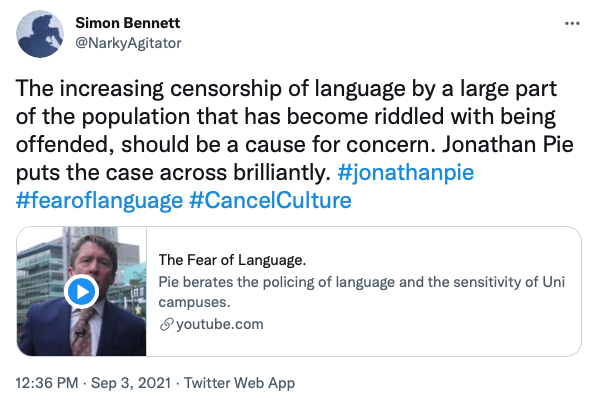“Why are people so afraid of language?”
This satirical comedian’s words struck a chord. I have been amazed recently at the number of people who contact the editorial team here at Elephant Journal, stating their displeasure at the title of an article, or the author’s choice of terminology.
We often include “editor’s notes” to clarify that:
“Elephant Journal articles represent the personal views of the authors, and can not possibly reflect Elephant Journal as a whole.”
We also openly invite everyone to share their own experiences and to write about matters that they disagree with or feel strongly about.
For the first time, yesterday, I was able to relate to what a reader was saying, as I too had experienced an initial gut reaction to a title that had made her feel uncomfortable. I had swallowed it down, read the article, and established why the title was written the way that it was. I gave myself the time to sit with the discomfort and the emotions that it triggered in me and establish why they had arisen.
Often when something causes a reaction of this nature, it is due to our past experiences or prejudices.
A common knee-jerk response to this sadly is, “I’m never going to read anything on Elephant again.” That’s the society we live in now. People tend to choose which news channels, social influencers, comedians, and other high profile figures to follow, based on who they actually agree with. Surely we will learn more and expand as humans when we do the opposite?
It seems as though it has become acceptable for us to take offence to anything we choose to feel offended by.
It also feels to me as though this is a privilege, given many around the world are surviving a pandemic whilst living under the rule of extremists, or life-restricting economic circumstances, or during an environmental disaster.
I remember being astonished a couple of years ago, when people were voicing how offended they were by the seasonal hit, “Baby, It’s Cold Outside.” This was a romantic song written by a man in the 1940s to sing with his wife at the end of a dinner party. It is from an entirely different era, and the modern interpretation of the lyrics are, I am sure, entirely different to those that the composer and lyricist intended.
What has happened to having an appreciation of context?
We’ve witnessed similar criticism of the 1960s prize-winning novel, To Kill a Mockingbird, because it uses language of its time, which is no longer acceptable. People are offended, so universities are removing it from their curriculum.
We see trigger warnings, censoring, editing, and banning across every media stream in existence, because something may cause offence—yet offence is subjective, and it is a choice.
You can choose to spend your time and energy being offended, or you can decide to put it to good use reflecting on what caused you to feel the way you do, and address the root of the issue, not the trigger.
Jonathan Pie says it in a little more extreme fashion—naughty language ahead, and not for the easily offended:
~


 Share on bsky
Share on bsky





Read 10 comments and reply